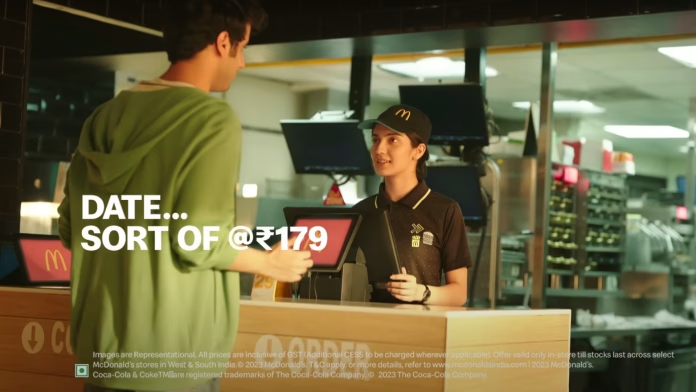McDonald’s has continually relied on innovation as a fundamental strategy to attract customers to its outlets worldwide. However, there are instances when company strategies, particularly in areas like advertising, can generate criticism from the public. Recently, McDonald’s posted an advertisement on their social media platforms depicting a man purchasing a meal and a female staff member delivering the food to him.
The advertisement portrays a scenario where both the man and the woman exchange meaningful glances, suggesting the possibility of a budding love story. Shortly thereafter, the man is seen standing in line once again, eagerly anticipating the opportunity to approach the woman and strike up a conversation.
“Sometimes, the greatest love stories start with the tiniest things – a glance, a smile, a meal. Watch this unusual date and find out how a meal can give you #MoreForLess at just Rs.179! Visit a McDonald’s near you and get McVeggie Meals @ Rs.179,” McDonald’s wrote in their tweet with the video.
The advertisement received significant backlash, with many questioning the rationale behind its creation. Numerous critical responses were triggered by the ad, as people raised doubts about the concept behind its production.
First Global Chairperson and Managing Director Devina Mehra replied to the ad on Twitter, asking who was behind its approval.
The ad faced criticism from several others as well, with many expressing their disapproval of the concept depicted in the advertisement.
“This is outrageous and disgusting beyond words
- You are inviting your customers to hit on your employees
- Creating potentially unsafe workplace for your female employees
- Objectifying your female staff for profit by suggesting your customers can flirt and find a date here,” one user wrote.
“McDonald’s ad encouraging customers to flirt with the employees,” another user wrote.
Coincidentally, around the same time, Zomato faced backlash for their recent advertisement featuring a character from the movie Lagaan, named “Kachra.” The intention of the ad was to convey the significance of avoiding food wastage, but unfortunately, it resulted in criticism due to its portrayal.
Read More: Zomato faces controversy over ad featuring ‘Lagaan’ character as recycled waste, takes down video





